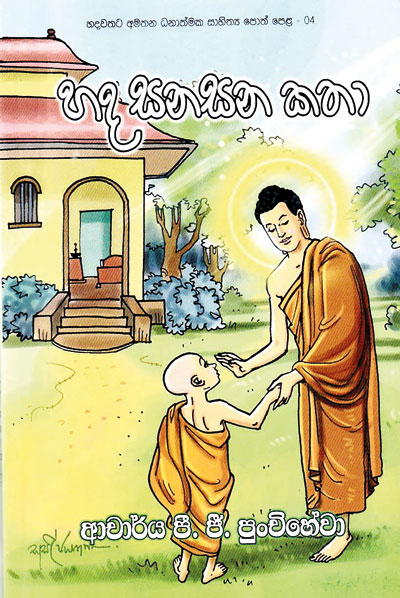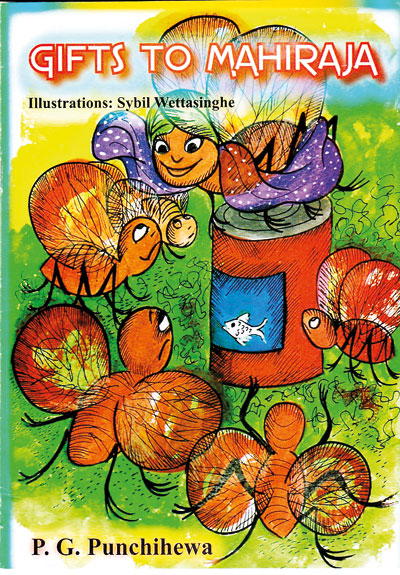Mosaic of morals for children
View(s):
I never realised that my Peradeniya campus mate, retired civil servant, Dr. P.G. Punchihewa had been a prolific writer in his own quiet way. I knew he loved to write and I have read a number of his books. Only now I realise that he has written over 30 books, including seven in English. He has won the State Literary Award twice – once in 2002 for Podi Hamuduruwo saha Venath Katha and then in 2009 for The Shattered Earth.
Punchi (as we fondly call him though he is in no way small!) has a mission. Most of his books are meant for young ones in grades 4-13 and he attempts to inculcate moral values and discipline in them. He has done a series of books on this theme. The latest is Hada Sanasana Katha (tales that bring solace) – a collection of 35 tales based on Suttas, Theri Gathas, Jathaka stories and other tales related by the Buddha.
Written in simple language, he has kept each story short, and adds a few questions at the end prompting the young reader to refresh his or her memory by answering them.
A bilingual writer (there arenât many), Punchiâs strength is his simple style which makes his books lively, interesting and most readable, whether they are in Sinhala or English.
The stories in Hada Sanasana Katha have come down the ages and been discussed in households. I remember my grandmother keeping me on her lap and relating some of them. Not everyone could read back then so it was customary for an elderly person who could read to pick stories from the Pansiya Panas Jathaka Potha and read them out loud on Poya days for the benefit of devotees who observed Ata Sil at the village temple. Today every child can read but whether they do read or what they read is the question. Itâs the iPhone era. Are they in the mood to read? Or do they even find the time to read having to spend hours at tuition classes after school?
Anyway, Punchi should know better. The stories he has selected convey a message. To quote one example, he presents the Donapaaka Sutta in the Sanyukta Nikaya in less than two pages under the title Pamana dena anubhave karanna (watch the quantity you eat) relating the story of King Kosol who goes to meet the Buddha after a heavy meal, breathing heavily and sweating. The Buddha realises his plight and comments: âOne who is conscious of how much he should consume does not suffer. He digests the food well. He lives a long life.â The king thereafter gets his personal assistant, Sudassana to recite the Buddhaâs stanza every time he sits for lunch and follows the Buddhaâs advice. Soon he feels he was not putting on weight and is quite comfortable. The king realising how beneficial the Buddhaâs advice was, rejoices saying that the Buddha had guided him not only in this world but the next birth too.

The stories include the often quoted ones like Patacharaâs dilemma, Punnaâs alms, the loving couple NakulaPiya and NakulaMatha, and Bhikkhu Sariputtaâs simplicity. Jayashantha Pereraâs line illustrations have been done well.
The inclusion of guidelines for teachers at the end of the book should inspire them to read the stories and encourage their students to do the same.
Along with the new Sinhala book, Punchihewa launched the latest in his Mahi Pancha series – with illustrations by the ever-in-demand book illustrator Sybil Wettasinghe.
Titled âGifts to Mahirajaâ Â this is about Mahi Pancha, the adventurous and mischievous little fly who is now king and takes his duties and obligations seriously. He has to solve problems relating to scarcity of food, floods and lack of housing. As the king finds solutions, people start coming to him with more problems. When he solves these, they start bringing gifts causing much embarrassment. Among the gifts are beesâ honey, dry fish, jaggery and sugar, none of which the king decides to consume since it amounts to bribery, but lets the people use. Their reaction is cleverly described in the book.
The king faces another problem. He is being invited to all sorts of functions both public as well as private ones like weddings. His solution to that too is interesting reading.
The stories provide ample material for interesting and absorbing drawings. Sybil, in her inimitable style, has done justice. Her colourful illustrations are bound to attract the young readers.
| Book FactsHada Sanasana Katha and Mahi Pancha by Dr. P.G. Punchihewa. Reviewed by D.C. Ranatunga |


